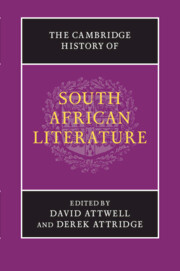Book contents
- Frontmatter
- Introduction
- PART I ORATURES, ORAL HISTORIES, ORIGINS
- PART II EXPLORATION, EARLY MODERNITY AND ENLIGHTENMENT AT THE CAPE, 1488–1820
- PART III EMPIRE, RESISTANCE AND NATIONAL BEGINNINGS, 1820–1910
- 9 Writing settlement and empire: the Cape after 1820
- 10 The mission presses and the rise of black journalism
- 11 The imperial romance
- 12 Perspectives on the South AfricanWar
- 13 The beginnings of Afrikaans literature
- PART IV MODERNISM AND TRANSNATIONAL CULTURE, 1910–1948
- PART V APARTHEID AND ITS AFTERMATH, 1948 TO THE PRESENT
- PART VI SOUTH AFRICAN LITERATURE: CONTINUITIES AND CONTRASTS
- Index
- References
10 - The mission presses and the rise of black journalism
from PART III - EMPIRE, RESISTANCE AND NATIONAL BEGINNINGS, 1820–1910
Published online by Cambridge University Press: 28 January 2012
- Frontmatter
- Introduction
- PART I ORATURES, ORAL HISTORIES, ORIGINS
- PART II EXPLORATION, EARLY MODERNITY AND ENLIGHTENMENT AT THE CAPE, 1488–1820
- PART III EMPIRE, RESISTANCE AND NATIONAL BEGINNINGS, 1820–1910
- 9 Writing settlement and empire: the Cape after 1820
- 10 The mission presses and the rise of black journalism
- 11 The imperial romance
- 12 Perspectives on the South AfricanWar
- 13 The beginnings of Afrikaans literature
- PART IV MODERNISM AND TRANSNATIONAL CULTURE, 1910–1948
- PART V APARTHEID AND ITS AFTERMATH, 1948 TO THE PRESENT
- PART VI SOUTH AFRICAN LITERATURE: CONTINUITIES AND CONTRASTS
- Index
- References
Summary
Throughout a roughly fifty-year period in the late nineteenth century which saw the emergence of African nationalism, articulated in the black press by the rising Christian elite, there were specific nodes that facilitated early black print culture. What Switzer (‘Introduction’, p. 22) has called ‘the African protest press’ was nurtured in indigenous Christian communities that emerged from rural stations which European and American missionary societies first established in southern Africa during the early nineteenth century. The mission schools of the various societies working among the indigenous peoples created literate (kholwa) communities on mission stations, and their presses gradually produced a literature in the vernacular among the amaXhosa and Batswana in the Cape Colony, the Basotho in Basutoland (Lesotho) and the southern Orange Free State, and the amaZulu in Natal and Zululand.
Whilst the spoken languages of the various indigenous peoples were highly developed and their traditional lore abundant, none had a written alphabet, so the task before the early missionaries from various missionary societies was to provide orthographies for the different vernaculars, to initiate a culture of reading and writing, and to disseminate the Scriptures and other religious material to an increasingly literate readership. ‘The preaching and teaching ministry’, notes Switzer in Power and Resistance (p. 119), ‘were dependent on the mission's control and manipulation of literate culture.’ Most mission stations acquired a printing press in order to publish devotional and evangelical literature and to assist in the industrial training of new male converts.
- Type
- Chapter
- Information
- The Cambridge History of South African Literature , pp. 204 - 225Publisher: Cambridge University PressPrint publication year: 2012
References
- 1
- Cited by

